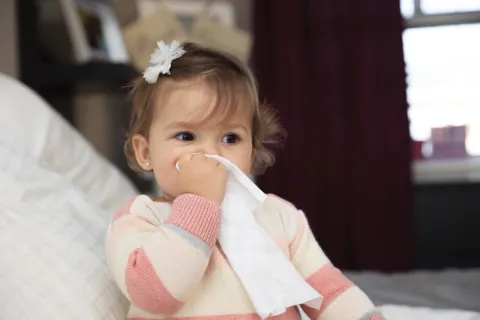
Respiratory syncytial (sin-SISH-uhl) virus, or RSV, is a common respiratory virus that usually causes mild, cold-like symptoms.
Most people recover in 1-2 weeks on their own. But it can be dangerous, especially for babies, young children, older adults and those with weakened immune systems.
RSV spreads through droplets that contain the virus. You can get it if you touch a surface that has the virus on it—like a doorknob or someone’s hands—and then touch your face. It also spread through droplets in coughs and sneezes.
You Can Spread RSV Before You Feel Sick
People with RSV are contagious for 3-8 days. RSV can spread 1-2 days before you feel sick. So it spreads easily in families and groups.
You can return to work, school and other activities when you have been without a fever for at least 24 hours and your symptoms have improved.
How to Prevent It
RSV Antibody for Babies
A new medicine called nirsevimab (RSV antibody) can prevent serious RSV illness in infants and babies. RSV antibody will be available sometime this fall.
- All infants under 8 months old should get RSV antibody before or during their first RSV season.
- Babies 8–19 months old who are at higher risk for severe RSV should get RSV antibody before their second RSV season.
- Babies born in fall and winter should get RSV antibody in their first week.
Talk with your pediatrician or clinic about getting nirsevimab.
RSV Vaccine for Older Adults
RSV vaccine helps protect adults 60 years and older from RSV. Ask your doctor to see if this vaccine is right for you.
To Keep RSV from Spreading:
- Stay home if you're sick.
- Keep sick kids home.
- Wash your hands often with soap and water, especially when around someone who is sick.
- Clean high-touch surfaces often (doorknobs, light switches, counters, phones).
- Avoid touching your face if your hands are not clean (especially eyes, nose and mouth.
- Avoid close contact (kissing, shaking hands, and sharing cups or eating utensils) with sick people.
- Wear a mask, especially if you are sick or will be around someone who is sick.
Symptoms
Symptoms usually appear within a few days after infection.
- Runny or stuffy nose
- Coughing
- Fever
- Decrease in appetite
- Wheezing or trouble breathing
Symptoms usually appear in stages and not all at once. Call your healthcare professional if you or your child has trouble breathing or drinking enough fluids, or symptoms worsen.
Call 211 if you need help getting access to care.
Caring for Someone Who’s Sick
There’s no specific treatment for RSV infection. Most infections go away on their own in 1-2 weeks.
- For babies, clean out their nose to help them breathe and get enough to eat. Talk to a provider or pharmacist about the best way to do this.
- Drink lots of fluids to prevent dehydration. Infants should have breastmilk or formula.
- Give acetaminophen or ibuprofen for fever and pain. Never give aspirin to children.
- Ask your doctor before giving your child non-prescription cold medicines. Some have ingredients that are not good for children.
If your child struggles to breathe despite fever-reducing medicine and cleaning out their nose, you may need to bring them to the emergency room or call 911. Call your doctor or clinic first, if possible.
